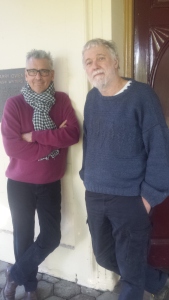 It would be no exaggeration to say that Edward Said has been one of the major influences on my intellectual life. I’ve waited sixteen years to read his 2000 memoir Out of Place, which deals with his early life in Cairo, Palestine and Lebanon, and his education in the US. Said began the book around the time of his leukemia diagnosis, which he explained as the impetus for the writing of this extraordinarily intimate account of his lifelong sense of dislocation. For me, Out of Place provided a key to understanding the emotional foundation of Orientalism, his entirely unemotional and razor-sharp critique of Western conceptions of the East.
It would be no exaggeration to say that Edward Said has been one of the major influences on my intellectual life. I’ve waited sixteen years to read his 2000 memoir Out of Place, which deals with his early life in Cairo, Palestine and Lebanon, and his education in the US. Said began the book around the time of his leukemia diagnosis, which he explained as the impetus for the writing of this extraordinarily intimate account of his lifelong sense of dislocation. For me, Out of Place provided a key to understanding the emotional foundation of Orientalism, his entirely unemotional and razor-sharp critique of Western conceptions of the East.
I completed my early degrees in Arabic and Linguistics just before Said’s Orientalism turned on its head the very concept of Oriental Studies, and I’ve spent many years pondering the intellectual upheaval that the book triggered in me. Looking back at my research career and my academic writing, it is now obvious to me how heavily I was influenced by Said’s work – even if that was not particularly clear to me at the time. His ideas have also never been far from my mind in my later life move into writing fiction.
I’m especially fascinated by the Cairo chapters in Out of Place given that I lived in Cairo in 1973 and 1974 and have just finished my novel Cairo Mon Amour set in that era.
I’m also struck by Said’s ultra-dry irony. Here’s a delicious example from his description of the stuffy English school he attended in Cairo in the early fifties (along with Michel Shalhoub, later known as Omar Sharif):
“The incarnation of declining colonial authority was the headmaster, Mr. J. G. E. Price, whose forest of initials symbolized an affectation of pedigree and self-importance I’ve always associated with the British.”
#
Learn more about Stuart’s books here.

 My challenge this week was to make an 80-second video promotion for my novel An Englishman’s Guide to Infidelity. I’ve used a DSLR camera previously for this kind of thing, but I just got an iPhone 6s, and it did the job just as well. I used iMovie to compile and edit the film, and Graphic to make the opening title. The only problem was getting the video file from the iPhone to my laptop because it was too big to email. In the end, I managed to do it with iCloud.
My challenge this week was to make an 80-second video promotion for my novel An Englishman’s Guide to Infidelity. I’ve used a DSLR camera previously for this kind of thing, but I just got an iPhone 6s, and it did the job just as well. I used iMovie to compile and edit the film, and Graphic to make the opening title. The only problem was getting the video file from the iPhone to my laptop because it was too big to email. In the end, I managed to do it with iCloud.
